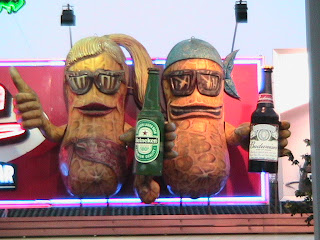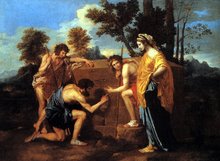
Friday, 27 July 2007
False Terror Flags!

Thursday, 26 July 2007
More Tales From the Veneto!

- Crossings on Italian roads are merely for show, although sometimes cars will stop, but rarely.
- Speed limits on Italian roads have no significance, they drive at whatever speed they feel like.
- Sudanese guys were selling fake designer handbags on the beach, getting caught handing over money for one could earn you a 1000 Euro fine.
- Littering could earn you a 500 Euro fine.
- Italians all carry ID cards (for security reasons?) and you could be asked to provide ID at anytime.
These were all valid points, and apart from the handbag statement which I wasn't going to try out, I saw all the others clearly demonstrated. They drive like maniacs, and if they see you on the crossing, they actually speed up so as to make you run for it. Like wise I frequently saw speeds of probably 70mph and upwards on a 30mph road. I was also aked for ID several times (completely unnecessarily in my opinion) such as when I changed some currency, and when I asked for a locker at Aqualandia, wtf?
Wednesday, 25 July 2007
Holiday Snaps!
Tuesday, 24 July 2007
Holiday Report!
 Here is the full holiday report from my exciting adventures in the Italian Veneto and beyond:
Here is the full holiday report from my exciting adventures in the Italian Veneto and beyond:Lido di Jesolo
Resumption Of Activity!
Thursday, 5 July 2007
Interruption To Scheduled Blogging!
What's In A Name?

- Patronymics - Taken from the fathers forename, for instance, where the father was called Donald, the surname derived from him could be; McDonald, MacDonald, Donaldson or just Donald.
- Occupations - Examples are; Wright (Carpenter), Skinner, Baxter (Female Baker) and the most common of all, Smith (Blacksmith).
- Place Names - Scottish Surnames derived from places near where I live include; Cullen, Fordyce, Keith and Findlater.
- Physical Charcteristics - Primarily hair colours such as Reid, Brown, Gray and Black or the Gaelic: Bowie - Blond or fair-haired and Duff - Black. Names such as Campbell and Cameron are supposed to translate as Crooked Mouth and Crooked Nose.
Of course there are other Scottish Surnames which do not fall into those categories, but in general most do. Also, should you find that you do have a Scottish Surname and particularly one which is fairly common, do not assume that you are therefore related to everyone who shares that Surname, because the same name may have several origins. For instance, my own Surname, Wilson, is believed to be derived from an Earl of Innes named William way back in the 14th or 15th Century. Yet, the name also originated in Caithness with the Clan Gunn, and other instances of the name originate early on in Glasgow, Dundee and also down in England.
My wife also has the rather rare Surname, Maver, the origins and meaning of which are highly questionable, but her family has been in Scotland since at least 1440, and yet the same name is prolific in Ljubljana, the capital of Slovakia, with apparently no connection whatsoever. Very odd!
Wednesday, 4 July 2007
The Waiting Game!

Tuesday, 3 July 2007
The Rise and Fall Of Communism!

Monday, 2 July 2007
History Is All About Blood!
- History is all about blood-shed
- History is all about bloodlines
- History is all about genetic traits
Which ever way you take it, there is a definite ring of truth. The expression "History goes to the victors!" is one with which I would definitely agree, because it is clear to me that many of our accepted views of historical events are false, precisely because it is the accounts of the victors which we rely on, when events were entirely different to what was actually recorded. For instance, Hitler didn't ensure that accurate records were kept for posterity regarding the genocidal atrocities, which he had ordered. Had he been victorious we might never have known other than in rumour.
Many other historical events follow the pattern whereby there is no external verification of events, such as Tacitus' account of Gnaeus Julius Agricola's defeat of the Picts at the battle of Mons Graupius. Julius Agricola was the father-in-law of Tacitus, so clearly had a vested interest in promoting the achievements of Agricola. It is actually debatable whether the battle even took place, and little evidence to suggest that the Romans managed to cross the River Spey, which presented a formidable barrier, especially if the Picts held the opposite bank. However, Tacitus knew that the Picts could not relate their version of events and so history tells us only what he, Tacitus, had to say.
As far as blood-letting effects history, you might suppose that War can have a positive effect on society because the superior force would win. However, using the First World War as an example, it could be suggested that the War set Britian back hundreds of years, because the majority of its brilliant young minds were needlessly killed. Meanwhile, back on the farm, the half-witted labourers spawned the next generation. A serious setback for the gene pool.
Blood-lines have played a significant part in the history of the UK, for over 1000 years this nation was controlled by an elite, who largely inter-married with each other and held on to titles, vast tracts of land, wealth, and small armies of servants. In this respect, they held what they did by virtue of blood.
How can genetic traits influence the course of history. As an example of how inter-breeding can impact heavily on society, I would highlight the Roman Emperors and the Pharaonic Dynasties. Doubtless, the irrational and often insane behaviour displayed by many of them was a direct consequence of incest. Obviously, I'm focusing on the negative viepoint here, but conversely, a broader gene pool does result in more intelligent offspring. Anyone with a broad spectrum of ancestral origins, I'm sure will quite clearly demonstrate proof of what I'm suggesting!















